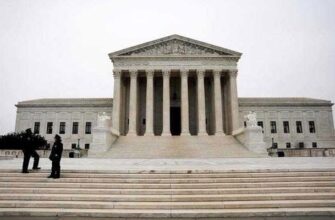A recent court decision has affirmed the Trump administration’s policy requiring individuals residing in the United States without legal status to register with the federal government and carry documentation, a directive that will take effect immediately.
Judge Trevor Neil McFadden, appointed by President Trump, ruled against those challenging the mandate. The judge’s reasoning didn’t focus on the merits of the administration’s arguments themselves but rather determined that the plaintiffs lacked legal standing to pursue their objections.
The Department of Homeland Security (DHS) announced a deadline of Friday for all individuals who have been in the country for 30 days or longer to register. The agency stated they will vigorously enforce this requirement, emphasizing its importance for national security and safety.
“President Trump and I have a clear message for those residing in our nation without authorization: depart now,” stated DHS Secretary Kristi Noem. “Leaving voluntarily may present an opportunity to return and experience the freedoms and possibilities of the American dream. This administration will uphold all immigration laws, ensuring we understand who is within our borders to safeguard our homeland and all Americans.”
The impetus for this action stems from a broader effort initiated in February when DHS began notifying individuals residing illegally that failure to comply could result in serious consequences.
The policy draws upon the Immigration and Nationality Act of 1952, which established various mechanisms to monitor and encourage voluntary departures from the U.S. These tools include:
- Criminal penalties for those who fail to leave the country as directed.
- Mandatory fingerprinting and address registration with the federal government.
- Potential fines or imprisonment, or a combination thereof, for non-compliance.
The registration requirement applies to all individuals aged 14 and older without legal status in the U.S., including Canadians who have spent more than 30 days within American borders – even seasonal residents known as “snowbirds.”
While this requirement has existed for decades, its enforcement has historically been limited. A prior example of such enforcement occurred after the September 11th attacks when the National Security Entry-Exit Registration System (NSEERS) mandated registration from noncitizen males aged 16 and older originating from a specific group of countries.
Despite not leading to any terrorism convictions, NSEERS resulted in over 13,000 individuals being referred for deportation proceedings. The program was ultimately suspended in 2011 and formally dissolved in 2016.




